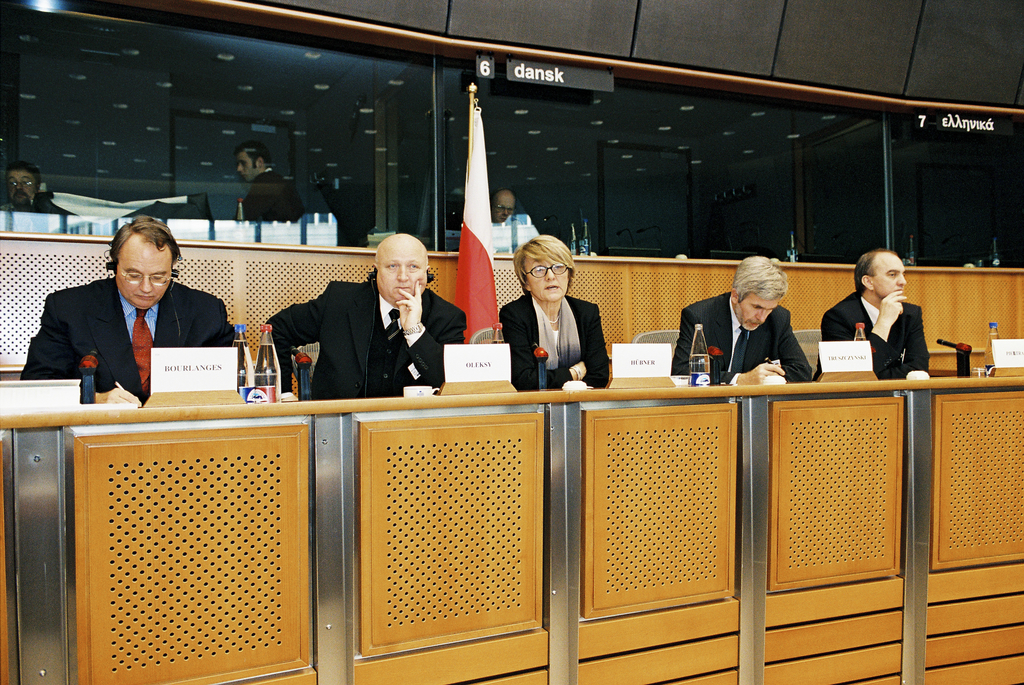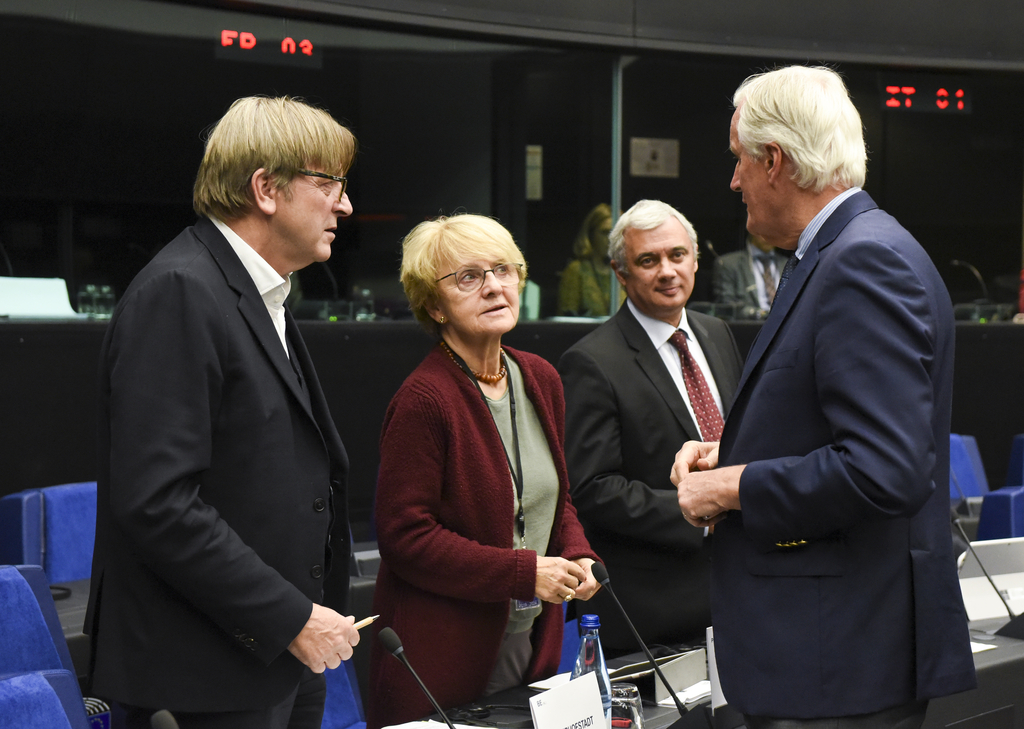Political groups
2009-2024: Group of the European People's Party (Christian Democrats)
National parties
2009-2024: Platforma Obywatelska
Biography
Danuta Maria Hübner was born in Nisko, Poland. She received her MSc in Economics from the Warsaw School of Economics in 1971 and her PhD and post-doctoral degree from the same university in 1974 and 1980 respectively. She was a visiting scholar at the Centre for European Studies at the University of Sussex in 1974 and a visiting scholar at Universidad Autonoma in Madrid. From 1988 to 1990, Hübner was a Fulbright scholar at the University of California, Berkeley.
From 1981 to 1987, she was Deputy Director of the Research Institute for Developing Countries at the Warsaw School of Economics. Hübner was also Deputy Director of the Institute for Development and Strategic Studies at the Central Planning Office in Warsaw from 1991 to 1994. In 1992, she was named a Professor of Economics at the Warsaw School of Economics, and she has lectured at California State University and at the Universidad Autonoma in Madrid. From 1991 to 1997, she was Deputy Editor-in-Chief of the Ekonomista (Economist), a Polish bi-monthly, and, from 1994 until 1997, she was Editor-in-Chief of Gospodarka Narodowa (National Economy), a Polish economics monthly.
Her political career began in 1992 as Chairwoman of the Social Planning Council at the Polish Central Planning Office, a position she would hold until 1996. She would continue to work in national politics. From 1994 to 1996, Hübner was Under-Secretary of State in the Ministry of Industry and Trade, where she was responsible for European integration and small and medium-sized enterprises. From 1994 to 1995, she was Advisor to the Deputy Prime Minister and Minister of Finance, co-authoring the government programme "Strategy for Poland". She was the chief negotiator on Polish accession to the OECD from 1995 to 1996. From 1996 to 1997, Hübner was State Secretary for European Integration. From 1997 to 1998, she was the Head of the Chancellery of the President of the Republic of Poland, Aleksander Kwaśniewski, and served as his Economic Advisor from 1998 to 2001. In 1998, she became Deputy Executive Secretary at the United Nations Economic Commission for Europe in Geneva, serving as Executive Secretary with the rank of the United Nations Deputy Secretary General from 2000 to 2001. Between 2001 and 2003, she was Head of Office of the Committee for European Integration and State Secretary in the Ministry of Foreign Affairs. She was Minister for European Affairs from 2003 to 2004 in the Government of Leszek Miller. In this capacity, she was responsible for the accession negotiations between Poland and the EU and represented the Government of Poland to the Convention on the Future of Europe.
 EU-Poland meeting in the European Parliament. L-R: Jean-Louis Bourlanges, Jozef Olessky, Danuta Maria Hübner, Jan Truszczyński, Jaroslaw Pietras © European Union 2002 - European Parliament
EU-Poland meeting in the European Parliament. L-R: Jean-Louis Bourlanges, Jozef Olessky, Danuta Maria Hübner, Jan Truszczyński, Jaroslaw Pietras © European Union 2002 - European Parliament
After the accession of Poland to the EU in 2004, Danuta Maria Hübner became a member of the European Commission with responsibility for trade and was appointed Commissioner for Regional Policy, a position she held until 2009.
Between 2006 and 2007, she served as member of the Amato Group, a group of high-level European politicians unofficially working on rewriting the Treaty establishing a Constitution for Europe into what became the Treaty of Lisbon.
From 2009 to 2024, Hübner was a Member of the European Parliament for Poland, representing the Warsaw Constituency as part of the European People's Party's Group. From 2009 until 2014, she was chair of the Committee on Regional Development and from 2014 until 2019 was chair of the Committee on Constitutional Affairs. From 2019 to 2024 she served on the Committee on International Trade and the Committee on Economic and Monetary Affairs, and was a substitute of the Subcommittee on Tax Matters and the Committee on Constitutional Affairs. During her term in office, in addition to her committee assignments, Hübner was a member of the Parliament's Delegation for relations with the United States (chair from January to July 2024), the Delegation to the EU-Mexico Joint Parliamentary Committee, and the Delegation to the Euro-Latin American Parliamentary Assembly. She was also active in the Delegation to the EU-UK Parliamentary Partnership Assembly, which was set up in 2021.
On 15 September 2010, she joined the Spinelli Group in the European Parliament and was also a member of the European Parliament Intergroup on Sports. From 2014 until 2019, she was a member of the European Parliament's Advisory Committee on the Conduct of Members.
In 2015, Hübner was one of the Parliament's two rapporteurs on a set of proposed changes to EU electoral law that sought to harmonise the variety of different electoral systems across the EU. From 2017 to 2020, she served on the Parliament's Brexit Steering Group.
 Extraordinary meeting of the European Parliament's Conference of Presidents on the state of play of the UK's withdrawal from the EU. L-R: Guy Verhofstadt, Danuta Maria Hübner, Pedro Silva Pereira, Michel Barnier © European Union 2019 - European Parliament
Extraordinary meeting of the European Parliament's Conference of Presidents on the state of play of the UK's withdrawal from the EU. L-R: Guy Verhofstadt, Danuta Maria Hübner, Pedro Silva Pereira, Michel Barnier © European Union 2019 - European Parliament
She was elected three times to the Executive Committee of the European Association of Development Research and Training Institutes (EADI) in Geneva (1987-1996). From 1971 to 2018, she was a Faculty Member of the Warsaw School of Economics (Institute of Economics, Institute of International Economic Relations).
Amongst the honours she has been awarded are the titles of Officier de l'Ordre national de la Légion d'honneur of France, the Emperor Maximilian Prize and the Order of the Tyrolean Eagle of Austria, the Grand Cross of the Order of Merit of Portugal, the Knight’s Cross of the Order of Polonia Restituta, and honorary doctorates from the Universities of Sussex, Sofia, Camerino, Poznan and Valenciennes.
For more information on her time as an MEP, click here.
Selected plenary speeches
On 7 October 2010, Danuta Maria Hübner spoke at the plenary session in her capacity as Chair of the Committee on Regional Development and author of an oral question to the Commission on EU cohesion and regional policy after 2013:
In the plenary debate on 11 May 2011, as rapporteur for the Committee on Regional Development's opinion on the 'Innovation Union: transforming Europe for a post-crisis world', she emphasised the importance of continuing to invest in innovation, particularly in times of crisis, and warned of the consequences of a potential innovation deficit for Europe:
In 2015, Hübner was co-rapporteur for the Committee on Constitutional Affairs' report on the reform of the electoral law of the European Union. In this capacity, she addressed the plenary session on 27 October 2015, presenting a number of proposals on how the 1976 Electoral Act could be adjusted to reflect the new realities in the European Union:
In the plenary debate on 9 June 2022 on the call for a Convention for the revision of the Treaties, she expressed her strong support for a convention. She pointed out that the Conference on the Future of Europe had demonstrated that a convention was the best path towards the Treaties that the Union needed to be able to cope with the new challenges it was facing:
What's in the archives?
The fonds contain MEP Hübner's speeches and other public interventions during 2009-2013, most of them concerning regional development, as she was chair of the Committee on Regional Development. The documents illustrating the parliamentary activity of the MEP constitute the majority of files from the archives. In addition, the fonds contain some files regarding the meetings of the Conference of Committee Chairs, from 2014.